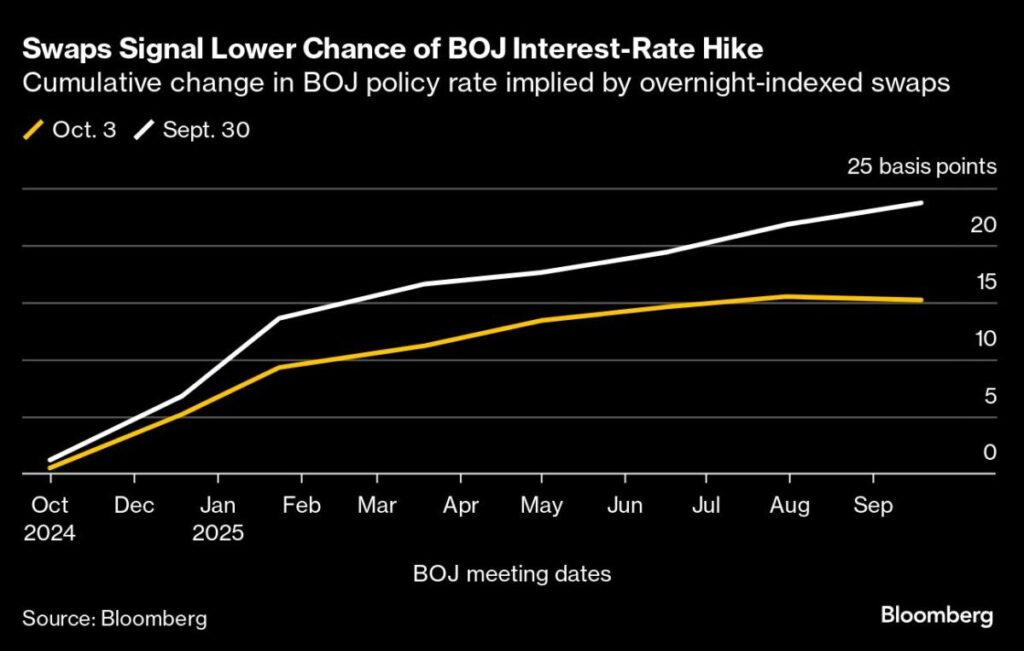(Bloomberg) — A yen-centered carry trade that helped fuel a market meltdown in August is back on investors’ radars.
Most Read from Bloomberg
Traders are re-loading speculative positions anticipating a weaker yen, emboldened by comments from Japanese Prime Minister Shigeru Ishiba that the economy isn’t ready yet for further interest rate hikes. RBC Capital Markets and Mizuho Securities Co. are among those who see risks of Japan’s currency falling back to 150 to 155 per dollar levels, boosting the appeal of selling the yen to buy higher-yielding assets across lucrative — but risky — carry trades favored by hedge funds.
“It’s back on,” Nick Twidale at ATFX Global Markets, who has traded Japan’s currency for a quarter of a century, said of the carry trade. “The new PM is essentially giving us the green light to sell the yen for now.”
The yen posted its biggest drop in more than two years on Wednesday on a closing basis after Ishiba’s warning blindsided investors who saw him as a supporter of policy tightening in Japan. Swaps traders cut the probability of a Bank of Japan December rate hike to about 22% from 26% on Wednesday, providing fresh impetus for traders to sell the world’s third-most-traded currency.
The development also puts the spotlight on Japan’s $4.4 trillion of assets offshore, and how risks of slower BOJ hikes could affect capital flow back home. While some have argued that these investments represent a giant carry trade, the holdings tend to be much longer-term and differ from speculative positions.
Over the short term, US jobs data on Friday could give investors fresh clues on the yen’s path.
What Bloomberg Strategists Say…
“Now that Ishiba has expressed his belief that the economy isn’t ready for further interest-rate hikes, traders have the green light to forge ahead with rebuilding carry trade positions ahead of the elections.”
Mary Nicola, Markets Live strategist
“The yen carry trade could come back with a boom, based solely on momentum on where the currency is heading,” said Shoki Omori, chief desk strategist at Mizuho Securities Co. “Dollar-yen at 155 is a risk if we see a dovish BOJ, stronger-than-expected US data and the dollar gets a bid from Middle East tensions.”
The yen extended losses in Asia Thursday, trading as low as 147.24, the weakest since Aug. 20. Communication with market participants is key, Ishiba said in a video address Thursday.
Temporary Setback
Others argued that the yen’s weakness is likely to be short-lived.
Ishiba’s unusually direct warning comes ahead of a national election on Oct. 27. and may reflect some inexperience in communicating with markets. Some like NLI Research Institute in Tokyo reckon it may be one way to raise the chances of a clear victory in the vote, which may reassure yen bulls that the currency’s weakness could be short-lived.
Further denting the appeal of shorting the yen is the currency’s swings, according to Macquarie Group Ltd. In the space of three months, the yen has traded as weak as a more-than-three-decade low of 161.95 against the greenback before snapping back to under 140 last month.
“It is a setback for the yen, but only a temporary one,” said Gareth Berry, strategist at Macquarie in Singapore. “It will just make it harder to reach our year-end dollar-yen target of 135 — but not impossible.”
For now though there may be little standing in the way of further yen weakness, especially after BOJ Governor Kazuo Ueda also sent dovish signals regarding Japan’s policy outlook.
The Fed’s rate cutting cycle would also be a key determinant of the currency’s direction, even as Ishiba’s abrupt shift is a “bummer for yen bulls,” said Charu Chanana, strategist at Saxo Markets in Singapore.
“Certainly you can make the case” that markets are seeing a resurgence of yen-funded carry positions, Chris Weston, head of research at Pepperstone, wrote in a note. However, with volatility still heightened and geopolitical risks prevalent, “it takes a brave soul to really go hard on getting stuck into carry here.”
–With assistance from Masaki Kondo.
Most Read from Bloomberg Businessweek
©2024 Bloomberg L.P.
Read the full article here

